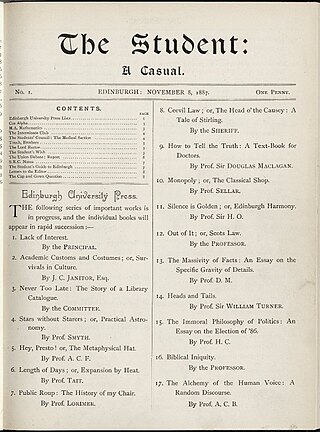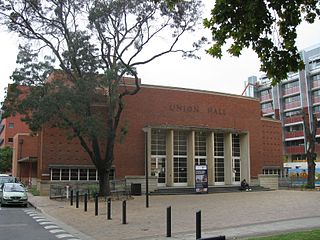| Year | Name(s) |
|---|
| 1932 | C.R Badger, K. L Litchfield, C. G. Kerr |
| 1935 | J.O Clark |
| 1936 | H. W. Piper |
| 1937 | Finlay Crisp, Helen Wighton |
| 1938 | Elliott Johnston, Gwenneth Woodger |
| 1939 | O. E. Nichterlein |
| 1940 | S. J. Jacobs, P. M. Viner Smith |
| 1941 | John Allison |
| 1944 | Roy Leaney |
| 1945 | Elliot Forsyth, Rowen Osborn |
| 1947 | D. E. Thompson |
| 1948 | F. B. Power, K. Tregonning |
| 1949 | Gilbert Wahlquist |
| 1950 | Jeff Scott |
| 1951 | Eric Schumann |
| 1952 | Jeff Scott |
| 1953 | Jonathan Cole |
| 1954 | Brian Bergin |
| 1955 | Margaret Robertson (until July), Ian Haig (from July) |
| 1956 | Ian Haig |
| 1957 | Colin Ames |
| 1958 | Gillian Cashmore, Brian McPhee |
| 1959 | R. H. Corbet |
| 1960 | John Heuzenroeder |
| 1961 | William Baynes, Des Cooper, John Finnis |
| 1962 | Richard Broniowski, Terry McRae, John R. Slee |
| 1964 | John Bannon, Jacqui Dibden, Ken Scott |
| 1965 | Sa Harris, Piers Plumridge, John Waters |
| 1966 | Jim Beatty, Bill Latimer |
| 1967 | Julian Disney, Peter O’Brien |
| 1968 | Peter Duncan, Arwed Turon |
| 1969 | Adrian Hann, Daniele Viliunas |
| 1970 | Garry Disher, Philip Lynch |
| 1972 | Peter Love |
| 1974 | Rosemary O’Grady |
| 1976 | Peter Otto |
| 1977 | Nick Xenophou |
| 1978 | John Sandeman |
| 1979 | Nonee Walsh John Sandeman (resigned) |
| 1980 | Andrew Fagan, Geoff Hanmer |
| 1981 | Paul Hunt, James Williamson |
| 1982 | Chris Barry, Tim Dodd |
| 1983 | Jenni Lans, David Mussared |
| 1984 | Mark Davis, Andrew Gleeson |
| 1985 | David Walker |
| 1986 | Moya Dodd, Paul Washington |
| 1987 | Jamie Skinner |
| 1988 | Sally Niemann, Richard Ogier |
| 1989 | Monica Carroll, Mark Gamtcheff |
| 1990 | Steve Jackson, David Penberthy |
| 1991 | Simon Healy, Dave Krantz |
| 1992 | Vanessa Almedia, Samantha Maiden |
| 1993 | Fiona Dalton, George Safe, Richard Vowles |
| 1994 | Lorien Kay, Tim Grow, David Mills |
| 1995 | Matt Rawes, Bryan Scruby, Natasha Yacoub |
| 1996 | Christina Soong, Frank Trimboli, Kerina West |
| 1997 | James Morrison, Fiona Sproles, Ching Yee Ng |
| 1998 | Susie Bate, Paul Bradley, Chris Slape |
| 1999 | Penny Fredricks, Anthony Paxton |
| 2000 | Dale Adams, Eva O’Driscoll, Darien O’Reilly |
| 2001 | Penny Chalke, Linley Henzel, Melissa Vine |
| 2002 | Michael Fyfe, Jenny Kalionis, Linda Rust |
| 2003 | Gemma Clark, Bonnie Cruickshank, Tristian Mahoney |
| 2004 | James Cameron, Tristian Mahoney |
| 2005 | Clementine Ford, Daniel Joyce, Danny Wills |
| 2006 | Stephanie Mountzouris, Anna Svedberg |
| 2007 | Ben Henschke, Claire Wald |
| 2008 | Catherine Hoffman, Michael Nicholson, Natalie Oliveri |
| 2009 | Vincent Coleman, Steph Walker Claire Buckley (resigned) |
| 2010 | Connor O’Brien, Myriam Robin, Mateo Szlapek-Sewillo |
| 2011 | Sam Deere, Elizabeth Flux, Rory Kennett-Lister |
| 2012 | Galen Cuthbertson, Emma Jones, Seb Tonkin |
| 2013 | Casey Briggs, Stella Crawford, Holly Ritson |
| 2014 | Sharmonie Cockayne, Daisy Freeburn, Yasmin Martin |
| 2015 | Daniel McLean, Daniel Millburn, Leighton McDonald-Stewart Zhuocao Sun (resigned) |
| 2016 | Lur Alghurabi, Natalie Carfora, Celia Clennett |
| 2017 | Jesse Davidson, Tom Haskell, Jenny Nguyen |
| 2018 | Aiden Bedford, Nuer Deng, Anzelle de Kock, Ethan Penglase Hayley Mohacsy, Connie Tran (resigned) |
| 2019 | Samantha Bedford, Maxim Buckley, Imogen Hindson, Emily Savage Olivia DeZilva (resigned) |
| 2020 | Nicholas Birchall, Felix Eldridge, Taylor Fernandez, Larisa Forgac |
| 2021 | Ivan Jankovic, Stasi Kapetanos, Isobel Moore, Michelle Roylance |
| 2022 | Grace Atta, Jenny Surim Jung, Chanel Trezise Habibah Jaghoori (removed) [21] |
| 2023 | Kathers Anderson, Sebastian Andrew, Louise Jackson, Sienna Sulicich |
| 2024 | Simranjeet Singh Dahia, Sarthak Khadotra, Urvi Patel |









